 |
|
Small picture of a big book -- this is the second half of an 800+ page doorstop published as two volumes in the US. Despite the size, it's definitely worth reading. If you've the time. |
|
|
|
The Agony Column for December 13, 2002
Commentary by Rick Kleffel
"Since brevity is the soul of wit... I will be brief..."
Lord Polonius in Hamlet
Act II Scene 2, Line 96
William Shakespeare
 |
|
Small picture of a big book -- this is the second half of an 800+ page doorstop published as two volumes in the US. Despite the size, it's definitely worth reading. If you've the time. |
Well, Shakespeare and Polonius may be witty and brief, but I'm asking your leave at the outset to be a bit effusive in my praise of brevity. I suppose it's fitting that little is said about the shorter side of recent readings. But it's also hard to say more than a little on the shorter side of fiction because so many books seem to suffer from bloat. Genre fiction in particular is guilty of this, with multi-volume epics that span years of reading and take down whole forests. Some publishers seem to encourage this, and then when they get what they want balk at the results. Witness the original publication of Dan Simmons' classic 'The Hyperion Cantos', which he has on occasion said should have been published as one massive volume, and have since. An excellent recent example of this is the 'Night's Dawn' trilogy by Peter F. Hamilton. Published as 800, 900 and 1,000 page-plus epics in the UK, they were trimmed in half for original publication in the states. That is, until they turned out to be a hit, at which point the third volume was published as one piece in hardcover and two in paperback. Don't get me wrong. There are lots of books that are long and I prefer many of them long. I enjoyed the 'Hyperion' books, Hamilton's novels, and a number of other books that are easily described as doorstops.
But these days, with my brain fractured by ten thousand disturbances, my attention shattered by another ten thousand crises and my time split amidst ten thousand more competing tasks, everything equally urgent, everything equally important, everything so earth-shatteringly compelling, I find it hard to set aside the time to tuck into a huge long novel. I do manage to do so with the help of inherited insomnia, but more and more I appreciate the smaller novels in life, those more in suiting with the current climate of fast food and a splintered attention span. And I bet that the readers are going to be shocked, shocked that I've found more than a few recent examples of shorter and better.
Alas, this does not usually translate down to short stories, though there are always exceptions. For whatever reason, I can rarely wrap my brain around short stories. The reason is something of a paradox. I believe is that most short stories are best consumed in one serving. But my time is so splintered, I can only rarely guarantee enough time to sit down undisturbed for long enough to read a story in one gulp. The kids, the dog (puppy, really), the rest of Life's Rich Pageant all queue up to annihilate peace more effectively than a triple crown Republican administration. So, I cant towards the novel as a reading format, since I can read it in smaller gulps and maintain focus across readings. It's nonsensical I know and more than a bit compulsive.
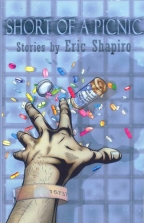 |
|
Eric Shapiro's 'Short of a Picnic may tell you more than you want to know -- about yourself. Each story in this short collection illsutrates a different form of mental illness. Which one are you? I'm "he brushed his teeth (Obsessive-compulsive disorder)" at the very least. |
So how would I know about compulsive? Well, in the obligatory exception to every rule, one of the better reads I've enjoyed lately is the short-in-pages long-in-content short story collection 'Short of a Picnic' by Eric Shapiro. Shapiro sent me his collection based on my interest in Chuck Palahniuk. 'Short of a Picnic' is rather similar to Palahniuk in both total gloom content and the prose stylings of the pained. 'Short of a Picnic' consists of twelve stories, each a dead-on accurate depiction of a variety of mental illness. The illnesses are identified in the Table of Contents but usually are not mentioned in the pertinent story. 'Short of a Picnic' is all show and no tell. The portraits range from the uncomfortable ("Carl", schizophrenia) to the flat out terrifying ("Two Hermits", multiple personality disorder). The entire collection is a mere 105 pages, and the stories within are correspondingly short. The diminutive length of the stories does not soften their impact, though sometimes they verge more on vignettes than stories. Still, I'm one of those people who find mental illness both fascinating and terrifying. 'Short of a Picnic' was an easily readable plunge into a rainbow of madness, that due to its incipient terror content I found very frightening. Some readers may find it simply discomforting. In any analysis, it's a very clever idea that manages to bee both entertaining and informative. Let's put it this way. Do you have a DSM (Diagnostic and Statistical Manual of Mental Disorders) sitting somewhere on your shelf? Yes, yes, I know you only have it for research. If so, then you want to read this book.
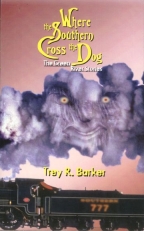 |
|
This short collection of stories has some intriguing artwork in the style of J. K. Potter and the apparent approval of Steve Rasnic Tem, who provides an introduction. |
Small page-count short story collections probably work for me because they don't involve a huge commitment to reading short stories. So when I spotted 'Where the Southern Cross the Dog: The Green River Stories' by Trey R. Barker in the latest Ziesing catalogue, I snapped it up. Three stories, seventy pages of southern tinged horror based around the blues. I haven't read it yet, but it's definitely in the queue. The lovely little Fairwood Press publication is a trade paperback with JK Potter style B&W photo collage illustrations by Eric M. Tuttle. Two of the stories appeared in small press publications, 'Terminal Fright' and 'Epitaph'. The third appears here for the first time. Both this collection and 'Short of a Picnic' also feature something else very desirable -- a nice package at a nice price.
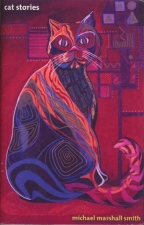 |
|
I guess I allow these short collections of short stories into my queue because they don't require a huge commitment to reading a big book o' stories. Call me lazy if you like, it makes no nevermind to me. |
Readers looking for a short collection of short fiction might want to try to scare up a copy of Michael Marshall Smith's 'Cat Stories'. It's going to be hard because there weren't a lot of copies printed, and Smith is getting big-time mainstream attention for his latest suspense novel, 'The Straw Men'. 'Cat Stories' includes three longish stories, two available in his collection out last year, 'What You Make It', one never before published. All the stories revolve around cats of one type or another. More importantly, all of them are up to Smith's usual standard of excellence, and cover the wide ground his fans have come to expect -- horror, urban fantasy and science fiction. Slim, signed and ready to re-sell at an x-hundred percent profit, 'Cat Stories' is the kind of collection that I actually mange to get through.
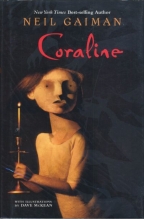 |
|
I really furrowed my brow and harrumphed a couple of times at this book due to its instant popularity. But it's actually a very good book, one of Gaiman's best. |
One great way to beat the bloat factor is to read children's books. Eventually, when I get round to some other non-short reading, I'll write about the recent crop of great kids' books, but for right now, I've got to mention Neil Gaiman's 'Coraline' as a fantastic example of the shorter-is-better ethic. Now most of the readers will have heard of this novel -- how could you not, since it's given prominent display at even the most megalithic bookstores. But like me, some of you might have wondered is Gaiman, now the most popular guy on the block, might have reached his sell-by date with this kids' book. His success in the world of graphic novels has earned him accolades in advance for his novels. 'American Gods' won a batch of awards. But apparently Gaiman is not yet ready to retire. 'Coraline' is another nearly perfect work by this talented author, to my mind, much better than the award winner. That's because Gaiman never panders to his audience, and reigned in by the demands of that audience, writes a taut tale of terror with a very well defined monster. Gaiman is positively science fictional in the best sense of the word as he spins the story of Coraline, a girl drawn into a netherworld in her new house. Stripped down and stronger than dirt, 'Coraline' shows that a short and simple novel can be as powerful as a doorstop.
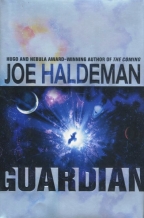 |
|
This short book is told in an utterly compelling voice. It's not what you expect, and that makes it suprisingly good. |
Of course, one tends to associate big publishers and big-name authors with all Doorstop phenomena. In a delightful exception to this and just about any other rule you could care to name, Ace has just released veteran SF author Joe Haldeman's 'Guardian'. Clocking in at a slim 229 pages, 'Guardian' hardly seems like a genre novel for much of its length. It's that old standby, an interesting tale told well. It's the lightly and triply framed tale of Rosa Coleman, born as the privileged child in the antebellum South, who grows, marries, has children, and eventually flees her husband in journey that ends up in Gold Rush era Alaska. Haldeman is (with one scene as a possible exception) consummately tasteful in this novel. The voice of Rosa Coleman is as entertaining as any reader could hope for, her story compelling, the pictures painted by Haldeman's words strong and true. Though short and to the point, the novel has the kind of sweep that really could fill up a doorstop. But had Haldeman elected to do so, he would have diluted and ultimately drained the power inherent in his simple story. To my mind, there must be an alternate universe where this novel is chasing up the top ten NYT bestsellers. It has a very wide appeal to readers inside and outside the genre. 'Guardian' is a novel that sneaks up on you. This proves to be a very pleasant reading experience.
 |
 |
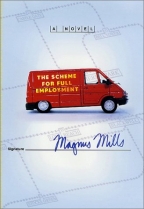 |
|
Magnus Mills' first novel is slyly evil and subtly funny. |
Magnus Mills' third novel is an entertaining fantasy parable. |
Mill's latest is another take on the working class. |
Magnus Mills is the purveyor of some rather wonderfully short novels that also happen to be rather wonderfully weird. His first novel, 'The Restraint of Beasts' moved him immediately into the spotlight with a Booker prize nomination while he was still working as a bus driver. That's not the sort of occupation that we apparently expect our fine writers to have. No matter. 'The Restraint of Beasts' operates somewhere in a the zone between Franz Kafka and H. P. Lovecraft, with it's decidedly working class protagonists barely aware that they working on deadly tasks of potentially cosmic significance. 'Three to See the King' ups the ante of weirdness. It's almost a fable of sorts, and exists in its own little universe where men build houses with tin roofs and listen to the wind whistling in the rafters. By keeping his work concise, he's able to build more powerful fantasy worlds than writers who go on and on about it all. Last night, I had to physically restrain myself from buying his latest novel, 'The Scheme for Full Employment'*. It's another short shot at the capitalist systems, this time detailing the travails of an anonymous narrator who participates in a bootstrap-style self-perpetuating scam that provides full employment for its participants, as long as they adhere to the simple set rules. A woman enters the picture and things go downhill amidst much entertaining bickering. Mills' sparse style keeps the page count down, and the chill and chuckle counts up. His works are little interludes of poignant fun in a literary landscape dominated by dour doorstops.
*[Actually, I went back the next day and bought it and read it as soon as possible.]
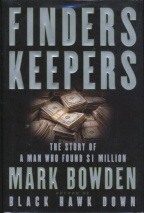 |
|
Here's a short work of non-fiction that will keep you glued to your chair more effectively than most novels. Funny, sad, and all true, except the bits where people lied or evaded the truth. |
One wouldn't expect Mark Bowden to be the purveyor of a very nice short book, but his latest, 'Finders Keepers' is precisely that. Bowden is best known as the author of the intense and rather depressing 'Black Hawk Down'. In comparison, 'Finders Keepers' is a rather lighthearted piece of non-fiction about a man who finds a million bucks in unmarked hundred dollar bills that literally fell off the back of the truck. Most readers will be able to devour this book in a day or two. Based on a series of articles that Bowden wrote for a Philadelphia magazine, 'Finders Keepers' is full of laugh-out-loud moments and an almost child-like sense of wonder. This isn't to say that it's without more than a tinge of darkness. Joey Coyle, the unemployed dockworker who finds the money is a meth addict, and his addiction colors his actions from the beginning of the book to the end. While the book is non-fiction, the reader will have to remind himself o that constantly. The book is every bit as gripping a piece of storytelling as the best novel. And, like the best novels, it's short enough to leave you wanting more.
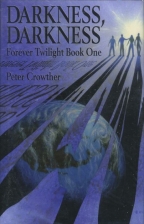 |
|
Crowther, who started PS Publishing and dedicated to the novella format had Cemeterey Dance publish this short novel of terror and alien invasion. |
Wanting more is a given in Peter Crowther's 'Darkness Darkness: Forever Twilight Book One'. Crowther cleverly cheats the doorstop phenomena by taking his doorstop and dividing it into easily readable and digestible chunks. 'Darkness Darkness' is the beginning of a very intense alien invasion saga. Crowther concentrates on the details and the action, letting the characters reveal themselves as events unfold. 'Darkness Darkness' is a claustrophobic, tense read, in which the pages can't possibly be turned fast enough. Since it is merely the beginning of a longer saga, there's a lot left unfinished as the pages finally run out. But Crowther is an absolute pro at the short form and the long form. He melds aspects of both in this novel and leaves the reader practically panting with fear and palpable terror.
|
|||
|
Mark Chadbourne's title, 'The Fairy Feller's Master Stroke' is a departure from his recent work in the 'Age of Misrule' series. The Di Filippo title is outstanding, and the Erikson title is sold out. |
There's a good reason that Crowther is such a pro at the short form. In the copious spare time that he has left after being a top-notch author he is the undisputed master of publishing short form genre oriented fiction. At the helm of PS Publishing, he's published some of the biggest and best names in speculative fiction, getting them to contribute their talents to a line of novellas that absolutely rock. I buy multiple copies of every title in the PS Publishing line, and I'd advise others to do so as well. After all, you'll need reading copies, shelf copies and investment copies of everything that Crowther publishes. I've covered and reviewed these books extensively in this column. No, not every work in a masterpiece but they are all without exception wonderful, worthy reading.
|
|||
|
All of these titles are sold out, but they're available from Gollancz in either hardcover or paperback editions. Thanks you Victor Gollancz -- that is Simon Spanton, the editor who makes sure you can get the best. |
I've reviewed of number of these titles, and read them all avidly. It's worth noting that if you miss out on the super-limited and not-without-cost PS Publishing editions -- many of them are sold out, either now or upon publication -- they're available from the smart folks at Victor Gollancz, who put four together in hardcover editions in a series that includes the titles 'Foursight' and 'Infinities'. Gollancz also puts them out as twofer paperbacks in another series which are called 'Binaries'. So missing the limited eds is no excuse for missing titles that include, Eric Brown, 'A Writer's Life', Mark Chadbourn's 'The Fairy Feller's Master Stroke', Paul Di Filippo, 'A Year in the Linear City', Steve Erikson, 'Blood Follows', Tracy Knight, 'The Astonished Eye', Tim Lebbon's 'The Naming of Parts', James Lovegrove, 'How the other half lives', Ken Macleod, 'The Human Front', Mark Morris, 'The Uglimen', Kim Newman's 'Andy Warhol's Dracula', Alastair Reynolds' 'Diamond Dogs', Adam Roberts, 'Park Polar', Michael Marshall Smith, 'The Vaccinator', and Conrad Williams, 'Nearly People'. Mind you these are just the ones I've reviewed. There are others, including the forthcoming and probably pre-sold out work by China Mieville, 'The Tain'. Let me tell you, they make a wonderful row on the top shelf here.
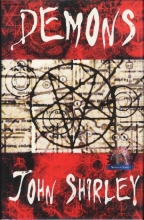 |
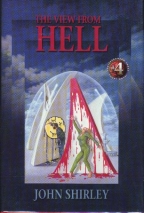 |
|
John Shirley's Cemetery Dance novella. Both CD and Sub have strong novella lines. |
Shirley's also written for the Sub press novella line as well. This novella is extermely terrifying -- you were warned! |
Now PS Publishing is not the first to market a line of novellas, though they were the first to come into being with a line that was at first exclusively novellas. Those venerable giants of the small press, Cemetery Dance and Subterranean Press both have novella lines that include some remarkably good works. John Shirley has written for both, providing 'Demons' for Cemetery Dance and 'The View from Hell' for Subterranean Press. They're both exquisitely awful. CD's line includes Ray Garton's '411', and a bevy of new works by authors you probably like. Likewise Subterranean Press, whose little collection of short stories by the wonderful writer Graham Joyce is titled 'Black Dust'. Joyce is one of those writers whose work is included in genre fiction but who gives readers the impression that he's about to break out into big-time literary fame. Subterranean Press is also about to publish a new novella by one of my favorite writers, Norman Partridge, 'Atomic Highway Number One: 59 Frankenstein'. How can you pass up a novella with a title like that by an author like Partridge, whose 'Wildest Dreams' lived up to its title?
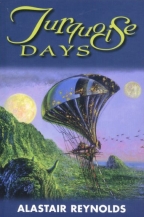 |
|
A gorgeous cover highlights one of Reynolds' best tales. There more here in this short novella than there is in most novels. You *must* buy this novella, if not in this format, then in the forthcoming version from Victor Gollancz. If there's justice (and it's very rare) this should be nominated for some sort of award next year. |
The esteemed publishers over at Golden Gryphon have also launched a series of novellas. The premiere work, Alastair Reynolds 'Turquoise Days' is one of Reynolds' best so far. Though it's only a novella, it covers a magnificently wide range of time, characters, feelings and emotions. It also sports a beautiful cover, and (should we be surprised here) is available next month from Victor Gollancz in a single volume combined with 'Diamond Dogs'.
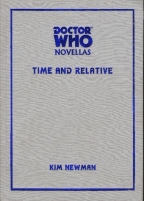 |
|
It's a weird idea -- have top-rate writers write novellas for a TV series that hasn't aired a new episode in what, 15 years? But if the series is Doctor Who and the writers are as good as Kim Newman, it's a recipe for success. |
One would be smart to think that TV rarely provides good reading opportunities. However, the folks over at Telos have undertaken to print a series of new novellas based on the immortal Doctor Who. As of this writing, I believe that the series has already gone under, but not before printing some fine titles by writers like Kim Newman ('Time and Relative') and Tom Arden.
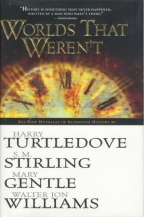 |
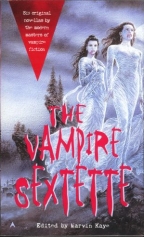 |
|
Two for four isn't a bad hit rate, especially if the hits are as strong as the titles by Gentle and S. M. Stirling. I'm still looking forward to reading 'The Peshawar Lancers', but at the moment I'm making my way through some serious doorstop material. |
See you at Spookycon! These Goth girls are probably of preview of what'll be on display in San Francisco january 11-13. I'll be there to talk to Ramsey Campbell and Poppy Z. Brite, if time permits. |
Big publishers have also leaped on the novella bandwagon in a fairly predictable manner, publishing collections of novellas. It's really not a bad idea, particularly when the results are as felicitous as 'Worlds that Weren't'. This collection of alternate history works includes two home runs -- Mary Gentle's 'The Logistics of Carthage', a novella set in the world of 'Ash: A Secret History' and S. M. Stirling's 'Shikhari in Galveston', set in the world of 'The Peshawar Lancers'. Together they justify the cover price. 'The Vampire Sextet' is an easier purchase to justify -- six novellas, paperback original, including an 'Anno Dracula' novella by Kim Newman, and new work by Brian Stableford and S. P. Somtow. Normally, the vampire deal would cause my brain to shut down immediately, but Newman and Stableford are two of the best authors out there, and I'll even read something written by them even if it is about -- ugh! -- vampires. Dig those Goth Girls on the cover. They'll probably be selling dead flowers at Spookycon.
Have I gone on long enough about the virtues of brevity? There's a lot more out there. And you can't claim that you don't have time to read these books. They're short enough that they can be finished inside of a week and long enough that they can sustain your interest beyond the fighting siblings, the demanding boss and the daily dose of bills, bills, bills. Wasn't that a song by Elvis Presley? You know one of those pop songs that's always less than three minutes long? I can almost hear the melody. It makes a nice background for my reading -- and though the individual works may be short, there's more than enough to keep me busy.
Thanks,
Rick Kleffel